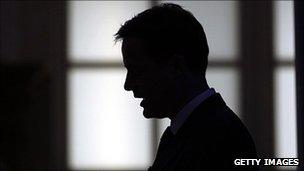Lib Dem conference: What lies ahead for Nick Clegg?
- Published
No party is immune to the ebb and flow of politics but one could forgive a Liberal Democrat for wondering when the tide will turn for them.
Since they last gathered for their party conference, the Lib Dems have had an awful year.
They have lost 747 councillors and nine councils in their worst English local elections for 30 years.

Mr Clegg's had a difficult year - is he expecting a difficult conference?
Their dream of electoral reform has been dashed for a generation after voters rejected the alternative vote in referendum.
Their opinion poll ratings are the lowest for 20 years. They have endured riots on the streets of Whitehall in protest at their support for tuition fees.
Their activists - after being welcomed or tolerated for years - have learned what it is like to be shouted at by voters on the doorstep.
And their leader, Nick Clegg, has been burned in effigy and had excrement shoved through his letterbox.
As their president, Tim Farron, notes frankly in their conference handbook, it has been a "particularly distressing" time for the party. They have not, he says, got their message across and they have suffered a loss of identity.
But all is not lost! For Liberal Democrats gathering in Birmingham, here are a few reasons to be cheerful:
They are in government: Some Liberal Democrats are still getting used to this fact. The party is going through a cultural change from the comfort zone of opposition to the rigours of government. But they are in office. Their ministers are making decisions. And if you are a member of say, the Labour party, this is not to be sniffed at.
They believe they are making a difference: The Lib Dems tested the coalition to the limit by driving through many of the changes to Andrew Lansley's health reforms. They are resisting Conservative ambitions to scrap the 50p top rate of tax. They are holding up Conservative attempts to repeal the Human Rights Act. They have secured the abolition of control orders. Their much loved pupil premium is being paid out to deprived schools. They claim they have tweaked Michael Gove's policy on free schools to make sure they are not just for middle-class parents. They have kept up the pressure on George Osborne to cut tax for the lowest paid. They have a green investment bank.
They are winding up the Tories: Last year Conservative and Labour MPs mocked Nick Clegg as a patsy, a "mini-me" riding on the coat-tails of David Cameron. Now they moan that he is the tail that is wagging the dog. The Daily Mail has anointed Mr Clegg as "the most dangerous politician in Britain". Nothing is more encouraging for a Liberal Democrat than to read how much their ministers are punching above their weight. Their conference slogan is "In government, on your side." It could equally be: "In government, a thorn in the Tories' side."
They have a shiny new headquarters: Gone is the labyrinthine rabbit hole that was their HQ in Cowley Street at Westminster. Instead, they are moving into spanking new offices just off Parliament Square with views of St James' Park and closer to the seat of power in Downing Street. What's not to like?
But in Birmingham there are dangers too.
Some Lib Dems want to reopen the health debate: Evan Harris and Shirley Williams are not willing to let the matter rest. They want a debate and vote at conference. They want to give their peers a mandate to push for further changes to the health bill as it begins its passage through the House of Lords. Nick Clegg is resisting. A debate is on the cards but he is refusing a vote. He wants health to be on a list of things the Lib Dems say they have changed. He does not want it to be on a list of things that are testing the patience of his Conservative coalition colleagues even further.
There is a limit to the new policy of loyal differentiation: In recent months, Mr Clegg and other Lib Dem ministers have made a point of using more robust language to illustrate what impact they believe they are having on policy. The quintessential text is Mr Clegg's recent speech on education, in which he emphasised how the Lib Dems had ensured that free schools are targeted at deprived areas with local authorities retaining an oversight role. The risk is that all this gets out of control at the Lib Dem conference and the party returns to its comfort zone of opposition within government.
There are one or two unexploded bombs that potentially could go off during conference: The Crown Prosecution Service is still assessing whether or not the Energy Secretary Chris Huhne should be prosecuted over allegations that he asked his wife to take speeding points for him, allegations he denies. Mr Clegg does not want an unforced reshuffle while he is fine-tuning his conference speech.
- Published15 September 2011